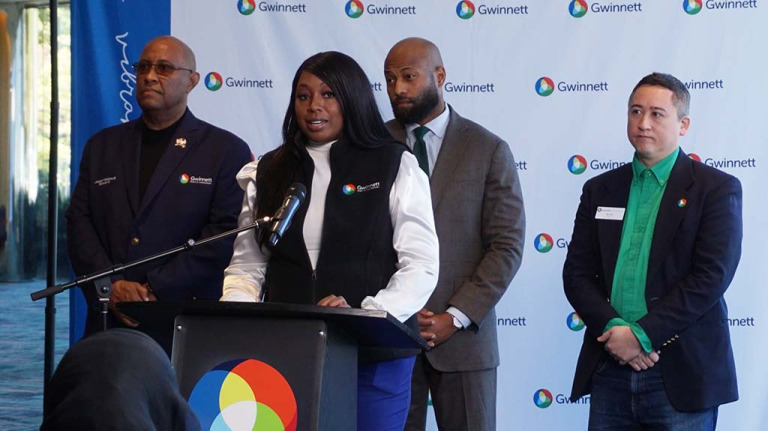Lawrenceville, October 31, 2025 — With more than 90,000 Gwinnett County residents set to lose access to federal nutrition assistance Saturday, local officials are racing to prevent a hunger crisis by pumping a quarter-million dollars into emergency food distribution networks spanning the county’s diverse communities.
The allocation, announced Friday by Board of Commissioners Chairwoman Nicole Love Hendrickson, represents an urgent local response to what she described as “a state of emergency” in food security—one that comes as federal employees enter their second month without paychecks and SNAP benefits face suspension.
“We are in a crisis situation right now,” Hendrickson told reporters at Friday’s press conference. “When federal safety nets are disrupted, local governments and communities have to step in.”
A Safety Net Under Strain
The numbers paint a stark picture: One in seven Georgians faces food insecurity. In Gwinnett, a county of more than one million residents representing over 100 nationalities, the federal shutdown has created a perfect storm—furloughed workers going without pay colliding with nutrition program suspensions that take effect Saturday.
Local food cooperatives are bracing for impact. Some expect as many as 300 additional families just on Monday, according to co-op leaders who spoke with officials this week. At Best Friend Park in Norcross this past Tuesday, the county served 71 households—the highest single-event turnout this year.
“Every statistic and number I shared is a story,” Community Services Director Lindsay Jorstad said. “It is a parent skipping dinner so their children can eat. It is a senior choosing between groceries and medicine or feeding their animal companion.”
Six Partners, One Mission
Under the emergency plan, Gwinnett will establish zero-dollar distribution agreements with six cooperative ministries strategically positioned across the county: Lawrenceville Co-op, Lilburn Co-op, Duluth Co-op, North Gwinnett Co-op, Southeast Gwinnett Co-op, and Neighborhood Cooperative Ministries in Norcross.
Using existing vendor contracts, the county will purchase high-demand items identified by the co-ops themselves: shelf-stable foods like soup, cereal, peanut butter, and pancake mix, alongside essential household items including dish detergent, laundry soap, and trash bags. County employees and volunteers will divide supplies equally and deliver them to all six locations, ensuring coverage across every zip code.
“These co-ops have been on the ground helping families for years,” Jorstad explained. “Working through them allows us to reach residents across the entire county while making sure help gets where it’s needed most.”
The funding comes from multiple sources, including leftover summer meal program dollars that officials chose to redirect rather than roll into next year’s budget.
Beyond Food: A Model of Wraparound Care
Gwinnett’s approach has evolved far beyond simple food distribution. What officials call “connection distribution” has become a nationally recognized model that brings together multiple county services at a single point of contact.
At mobile food distribution events, Fire and Emergency Services teams install free smoke detectors—one of which later saved an entire family, Jorstad noted. The Water Resources Assistance Program offers plumbing repairs and water-saving fixture installations. One Stop for Help Community Navigators connect residents on-site to housing, healthcare, and employment resources.
The results speak to the scale of need: This year alone, 42 mobile distributions have provided 334,000 meals to more than 64,000 residents. Since 2020, the county and partners have held 323 distributions, serving over 430,000 residents in 103,000 households and distributing 2.8 million pounds of food—nearly 2.3 million meals.
Community Fears and Accessibility Concerns
When asked about immigrant communities expressing fear of attending food banks due to immigration enforcement activities, Hendrickson acknowledged the complexity while emphasizing the county’s mission.
“I recognize that there may be a fear for those who may or may not be experiencing any immigration issues, but that is really not our role right now,” she said. “Our role is to make sure that we can get the food and resources to the community food banks and allow those entities to handle best how to deal with that population and how to deal with our residents who are in need.”
The chairwoman noted that the county has provided support to culturally responsive organizations serving immigrant communities, underscoring Gwinnett’s identity as one of Georgia’s most diverse counties.
“While we can’t control Federal immigration policy, so the best we can do is just to address the task at hand, which is addressing food insecurity. So we’ll do that to the best of our available resources that we have,” said Commissioner Kirkland Carden, District 1, which represents the most diverse population in Georgia.
Call to Action
Officials made clear that county resources alone cannot solve the crisis. Hendrickson issued what she called “a heartfelt plea” for businesses, cities, and residents to match the county’s commitment.
“We are doing our part. If you are able, please help us stock the shelves and keep them stocked,” she urged. “Even the smallest donation can make a huge difference and impact for our neighbors in need.”
The county is establishing collection sites at facilities across Gwinnett, and all 6,000 county employees will participate in internal food drives. Volunteers are needed at co-ops and upcoming distribution events.
“We know that no single organization can solve food insecurity alone, but together we can make a difference,” Hendrickson said.
When pressed on whether $250,000 would be sufficient, the chairwoman was candid: “I don’t know how far the funds or the food will stretch. We’re going to continue to evaluate the need and evaluate this challenge as it continues to evolve.”
Officials expressed hope that federal negotiators would restore services soon, but vowed to continue filling gaps as needed.
Looking Ahead
Upcoming free mobile food distributions will take place at 3 p.m. (while supplies last) at the following locations:
Nov. 4: Lenora Park, Snellville
Nov. 18: Bryson Park, Lilburn
Dec. 9: Rock Springs Park, Lawrenceville
Dec. 16: Shorty Howell Park, Duluth
Dec. 23: Rhodes Jordan Park, Lawrenceville
Additionally, Sheriff Keybo Taylor will host his signature Thanksgiving food giveaway from 11 a.m. to 4 p.m. on November 28 at the Gwinnett County Fairgrounds.
The county will also provide more than 6,750 meals to students in county-operated afterschool programs during school breaks, ensuring no child goes hungry during the holidays.
For seniors age 60 and older who are homebound, ill, or incapacitated, the Health and Human Services Division’s Home Delivered Meals Program provides weekly deliveries of five-day frozen meal supplies.
Resources for Residents in Need
One Stop for Help Community Navigators: (770) 822-8850 (available 24/7)
Community Services: (770) 822-8833 or communityservices@gwinnettcounty.com
Senior Meal Program: (678) 377-4150
Find local pantries: Atlanta Community Food Bank Pantry Map at ACFB.org
County information: GwinnettCounty.com or @GwinnettGov on social media









